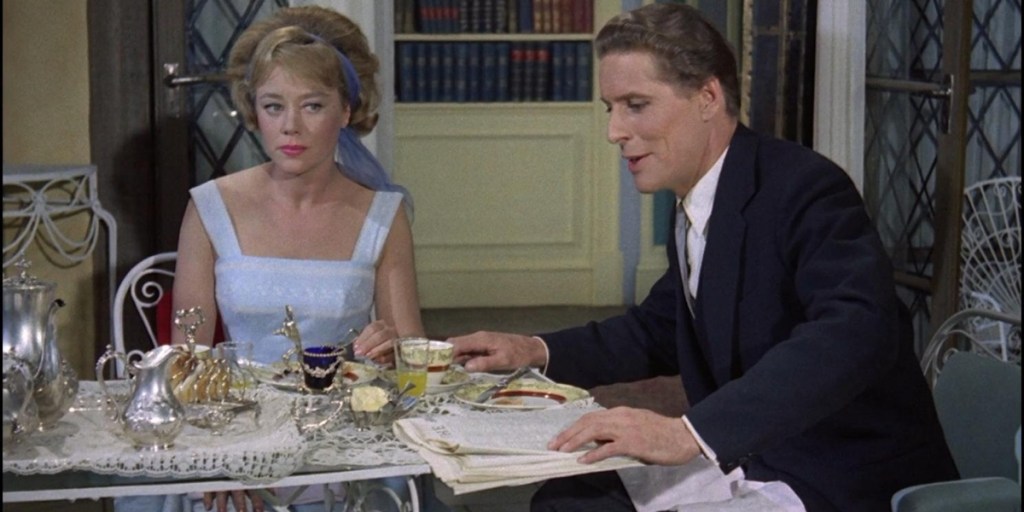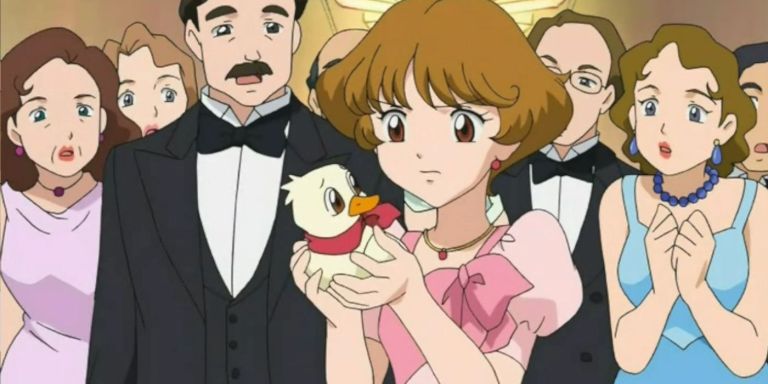Agatha Christie Screen Spotlight: Comedic Stage Adaptation ‘The Spider’s Web’

Farce is not a genre typically associated with Agatha Christie, but the 1960 film adaptation of her 1954 play The Spider’s Web makes a case that Christie’s typical mix of coincidences, personal secrets, forbidden relationships and hidden passageways lends itself perfectly to a drawing-room farce. Director Godfrey Grayson sticks largely to the drawing-room setting of Christie’s play, with a humorous tone and a bouncy score that render The Spider’s Web into a comical roundabout of comings and goings.
The opening credits of The Spider’s Web play out over simple hand-drawn pictures, with composer Tony Crombie’s jaunty music giving them the feel of a 1960s sitcom intro. There’s a definite sitcom tone to the movie, and at times it wouldn’t be surprising to hear a laugh track reacting to the way that the actors mug their way through absurd situations. “I could murder Sir John!” is the movie’s first line, delivered by flighty housewife Clarissa Hailsham-Brown (Glynis Johns) in mock exasperation against her husband’s boss.
That kind of playfulness continues throughout The Spider’s Web, as Clarissa faces a dilemma only slightly removed from the contrived situations that characters like I Love Lucy’s Lucy Ricardo and The Donna Reed Show’s Donna Reed were stuck with on their shows every week. Clarissa’s habit of “supposing” about far-fetched scenarios related to people in her life has made everyone around her skeptical of anything she says, especially her diplomat husband Henry (John Justin).
While Henry is out arranging an important summit with high-level foreign dignitaries, Clarissa receives an unwelcome visit from Oliver Costello (Ferdy Mayne), the unsavory current husband of Henry’s ex-wife. Oliver demands custody of Henry’s daughter Pippa (Wendy Turner), but Clarissa forcefully shoos him away from the large country estate the family has been renting for a suspiciously cheap rate. Later, Oliver sneaks back into the house to snoop in an antique desk with a hidden drawer, and he’s killed by an unseen assailant.
That leaves Clarissa with her sitcom crisis, since young Pippa seems to confess to killing Oliver, and Henry is on his way home with the foreign delegation he’s agreed to host for their important meeting. Clarissa decides that the only proper course of action is to hide Oliver’s body, and she enlists the help of three family friends who’ve been staying at the expansive estate.
“My dear Clarissa, you mustn’t go moving dead bodies about,” says Justice of the Peace Hugo Birch (Basil Dignam), but he goes along with the scheme anyway, as do Clarissa’s avuncular guardian Sir Rowland Delahaye (Jack Hulbert) and her younger associate Jeremy Warrender (Ronald Howard), whose connection to the Hailsham-Browns is never quite clear. Add in the estate’s nosy gardener Miss Peake (Cicely Courtneidge) and the seemingly shady cook and butler, and that’s an entire house full of characters scurrying about from room to room, opening and closing doors.
Some of those doors lead to secret corridors, all the better to fool the somewhat dim Inspector Lord (Peter Butterworth), who arrives at the house after receiving an anonymous tip about a murder. Inspector Lord is no Hercule Poirot or Miss Marple, and he’s fairly easily led on by the various lies that Clarissa and her accomplices tell about what happened to Oliver Costello.
“Poor Clarissa, she’s in there with the police,” Jeremy laments as Inspector Lord separates the suspects for interrogation. “Well, heaven help them,” Sir Rowland responds. Indeed, just as Clarissa runs roughshod over the hapless men in her life, Johns dominates the film with her charismatic and expressive performance.
While actors like Butterworth overplay their characters’ baffled responses to events, Johns gives Clarissa a sort of soulful sense of mischief. After a lifetime of “supposing,” she’s finally in her element as she responds to these unlikely extreme events, and she does it with a twinkle in her eye and a spring in her step.
Despite the presence of a dead body, The Spider’s Web is always lighthearted and silly, and while it feels a bit stagebound in its single setting, Grayson compensates with a bright (perhaps even garish) color palette, exaggerated performances, and that ever-present musical score. It takes surprisingly little adjustment to turn Christie’s material into a full-on comedy of manners.
By clicking 'Sign Up,' I acknowledge that I have read and agree to Hachette Book Group’s Privacy Policy and Terms of Use
What to Read Next
Josh Bell is a freelance writer and movie/TV critic based in Las Vegas. He’s the former film editor of Las Vegas Weekly and the former TV comedies guide for About.com. He has written about movies, TV, and pop culture for Vulture, IndieWire, CBR, Inverse, Crooked Marquee, and more. With comedian Jason Harris, he co-hosts the podcast Awesome Movie Year.


